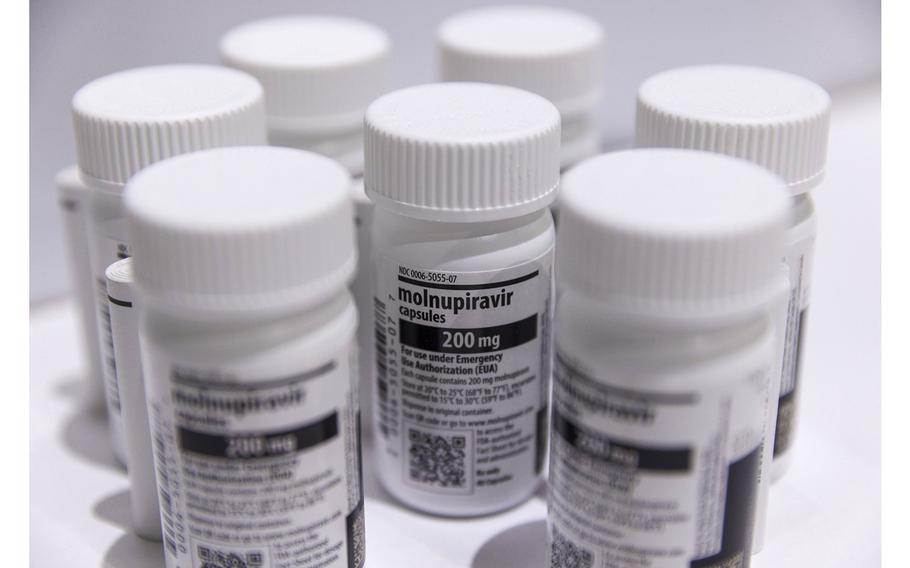
Bottles of Merck & Co. and Ridgeback Biotherapeutics LP’s Molnupiravir antiviral medication. The Biden administration recently announced its list of drugs subject to government pricing under the Inflation Reduction Act. This price setting, unfortunately, could have the unintended consequence of hindering medical research that could benefit veterans. In fact, it could be harmful for the very same patients helped by the PACT Act. (Kobi Wolf/Bloomberg)
Those who serve our nation in uniform take on considerable risks to their lives and their health.
That danger isn’t limited to the immediate peril of armed conflict. The battlefields on which our service members defend our freedom can be toxic themselves. And the risk from exposure to hazardous agents doesn’t end, even when our service members come home.
It is America’s moral obligation to provide our service members with the best possible care when they become ill or injured as the result of their service. That means doing our utmost to ensure they receive top-notch health care — including access to the many new breakthrough treatments and cures that are poised to emerge from research labs nationwide.
In August 2022, Congress passed the PACT Act, a major legislative victory for veterans and their families. It expanded health care and benefits for those exposed to toxic substances in the line of duty — from the chemical defoliant Agent Orange used in Vietnam to burn pits in Iraq. In the last 12 months, the Department of Veterans Affairs has approved about 350,000 disability claims under PACT.
The law expands the list of medical conditions, including various types of cancer, that the VA presumes were caused by exposure to toxic substances. It ensures veterans can be compensated for these conditions if they become ill at any time during their lives. This is important, as many exposure-related cancers manifest years after an individual’s military service.
At about the same time, Congress also passed the Inflation Reduction Act, one of whose main objectives was to make prescription medications more affordable for those on Medicare. The IRA includes a $35 cap on monthly insulin costs — and starting in 2025, a $2,000 annual cap on total out-of-pocket spending on prescriptions. Both provisions will benefit millions of veterans who rely on supplemental Medicare coverage to access their prescriptions.
Meanwhile, the recently established Advanced Research Projects Agency for Health, (ARPA-H), has just announced $115 million in new funding to support research projects to develop new therapies for the early detection and treatment of cancer. Earlier this summer, the agency created a new program seeking to develop technologies that will better enable surgeons to distinguish malignant cells from healthy surrounding tissue — so as to target the former with as little damage as possible to the latter. These are encouraging investments in research that may ultimately help veterans whose service exposed them to cancer-causing agents.
Yet the prognosis for veterans is not all rosy. One provision of the IRA has potentially troubling implications for advances in cancer treatment.
The IRA gives Medicare the authority to negotiate directly with drug makers for the first time, with the goal of lowering out-of-pocket costs for beneficiaries. Unfortunately, the legislation creates two classes of medications for the purpose of eligibility for price negotiations. This will have the unintended consequence of hindering medical research that could benefit my fellow veterans.
Developing breakthrough medicines is expensive. It costs drug companies more than $2 billion on average to bring a FDA-approved new medication to market — an amount that greatly exceeds the new ARPA-H funding — because only about 12% of initially promising drugs that enter clinical trials go on to win FDA approval. Drug makers have to rely on revenue from a few successes to recoup the costs of many failures — and to fund the next generation of research.
The IRA does allow an exemption period following FDA approval before a drug can be selected for negotiation. But the law gives one type of medications, small-molecule drugs, a shorter exemption period, nine years, than the 13 years afforded to large-molecule “biologic” drugs. Because of this disparity, drug makers are already shifting research investments away from small molecules and toward the development of biologics.
That’s especially problematic for veterans dealing with the long-term carcinogenic effects of toxic exposure, because small-molecule drugs are at the forefront of today’s cancer treatment breakthroughs. With pharmaceutical companies now considering whether to delay or even cancel research into promising new cancer treatments, I worry that this one disincentive in the IRA may undermine the important progress we celebrated with the passage of the PACT Act.
I served in Vietnam, and so far, haven’t been diagnosed with any of the cancers associated with Agent Orange. That makes me one of the lucky ones. Each year, though, more than 50,000 cancer diagnoses are reported to the VA’s Cancer Registry, and that number isn’t likely to shrink anytime soon.
America’s sons and daughters put themselves in harm’s way to defend our freedom, and we owe them the best possible care for the added risk they took on. I hope that clear-sighted policy solutions — like setting the exemption period for all new medications at a consistent 13 years following FDA approval — can help remove this inadvertent roadblock and allow research on lifesaving cures for our veterans to continue.
Anthony Principi served as U.S. secretary of Veterans Affairs from 2001-2005.